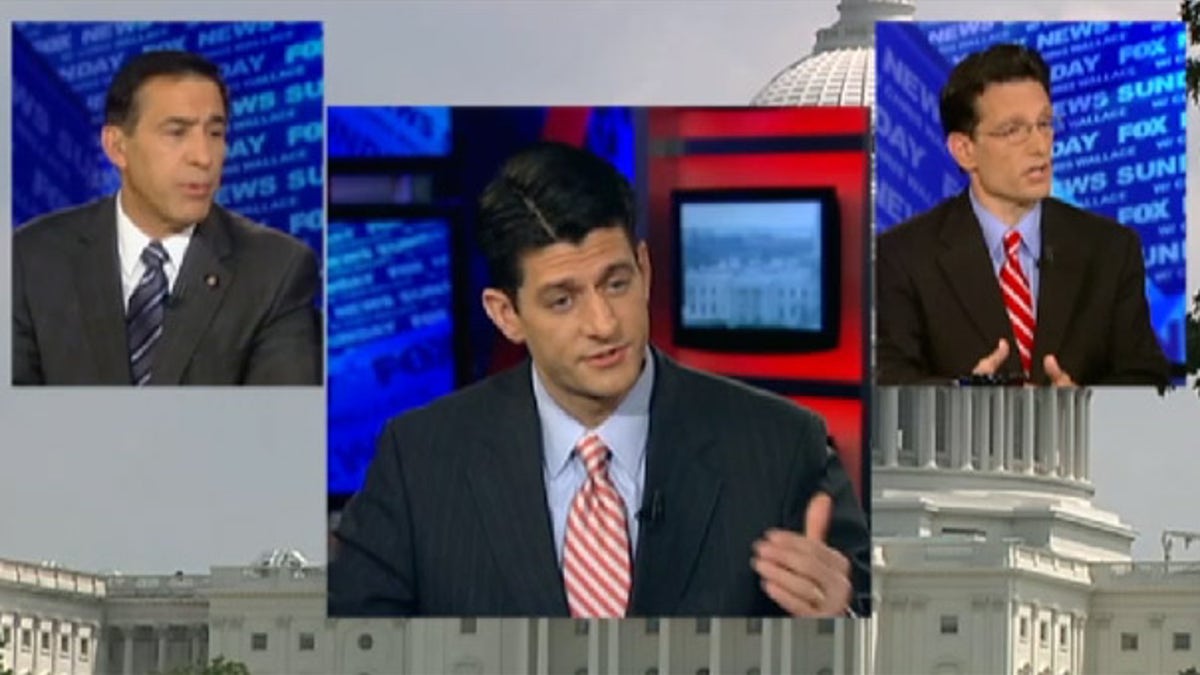
Republican leaders Reps. Darrell Issa, Paul Ryan and Eric Cantor are all looking for ways to reduce government spending. (FoxNews.com)
If voters didn't send a message in last week's election, somebody better tell Republicans because they heard one and are harmoniously repeating it.
"We don't have a revenue problem. We have a spending problem," as Senate Minority Leader Mitch McConnell, R-Ky., said Sunday.
In fact, no fewer than four Republican lawmakers who rode the wave of morning talk shows repeated the new mantra Sunday in what is undeniably the underlying theme behind the GOP approach to tackling government spending in the next Congress.
"The election result reflected the fact that people get Washington does not have a revenue problem. It's got a spending problem," Rep. Eric Cantor, R-Va., the expected next House majority leader, said on "Fox News Sunday."
"We do not have a revenue problem. We have a spending problem. Let's focus on the problem," Rep. Paul Ryan, R-Wis., the likely next House Budget Committee chairman repeated later on the same show.
"Well, I think it's not a revenue problem; it's a spending problem," said Sen.-elect Rand Paul, R-Ky., on ABC's "This Week." "A lot of times people would come to me and say, well, you don't believe in any government. And I would tell them, you know what? I believe in $2.4 trillion worth; I just don't think you can have $4 trillion worth if you only bring in $2.4 trillion."
Paul said some of the suggestions he will make to reduce the size of government include freezing federal hiring, reducing the federal workforce by 10 percent and possibly cutting wages for federal employees by 10 percent, though military would be exempted.
"The average federal employee makes $120,000 a year. The average private employee makes $60,000 a year. Let's get them more in line, and let's find savings. Let's hire no new federal workers," he said.
Paul added that he would also end earmarks and would consider an across-the-board cut of all programs, that includes military as well as social programs.
But reducing the size of government is easier said than done. Entitlements take up a majority of federal spending, and they are not budget items that Congress has the authority to cut. If the military were also removed from the budget-cutting formula, that leaves only 16 percent of the budget that Congress can chop.
In each Congress, lawmakers are confronted with the battle between political will and public perspective. A majority of Americans don't want Congress to touch the entitlement system. And the resolve is also apparently lacking within President Obama's deficit commission, which is expected to issue a set of recommendations next month for getting control of runaway spending.
But Ryan, who is a member of the deficit panel, said he doesn't expect a supermajority -- 14 of the 18 commissioners on -- to join him in a "grand bargain" to reduce entitlements because few on the panel have interest in redoing the new health care law, which takes $500 billion from Medicare over the next 10 years to pay for new programs.
"When it comes to entitlements, the big problem, about 85 percent of it, is health care," Ryan told "Fox News Sunday," noting that the group does agree that it is not interested in raising the revenue line but in decreasing the spending line.
"It's unclear where we're going to go. But I don't think you're going to see some big grand bargain. My personal hope is a big dent on spending in some categories where we can get some common ground on."
Rep. Mike Pence, R-Ind., who appeared on ABC's "This Week," said he too agrees that entitlement programs are "threatening the fiscal vitality of future generations of Americans" but balancing the budget -- and not merely by creating a spending freeze -- will be the new priority for Republicans.
"We think we ought to go back to pre-stimulus, pre-bailout levels and freeze there -- there's been an 84 percent increase in domestic spending since this administration took office. We've got to roll back there. That will save $100 billion in the first year. How about a net hiring freeze on Capitol Hill?" he said.
Rep. Darrell Issa, R-Calif., who appeared with Ryan on "Fox News Sunday," said not only congressional earmarks should be taken off the table but "administration earmarks" in the form of competitive grants need to be removed.
"That's where we give a slush fund, just like the stimulus, to the president. And then they come up with who they like and where they like them and they issue the money. Congress has to start saying no.You figure out who wins the competitive grant. You come back to us and say, 'I'd like to award this amount of money for this,' instead of a budget that has blank checks. If you do that, there will be less money awarded, and it will be awarded for more meritorious projects," he said.
McConnell agreed that he would like to limit congressional earmarks though it's not as easy as it sounds because of the process by which the president is given authority over spending in the states.
"The earmark issue is about discretion, about an argument between the executive branch and the legislative branch over how funds should be spent," McConnell, R-Ky., said on CBS' "Face the Nation." "We ought to also deal with executive branch earmarks. The stimulus bill that passed last year, the almost a trillion-dollar stimulus bill, was riddled with executive branch earmarks."




